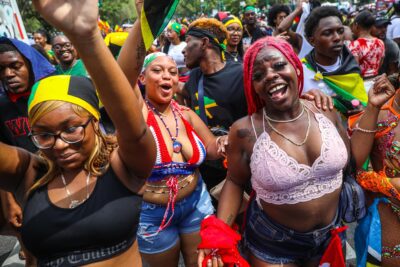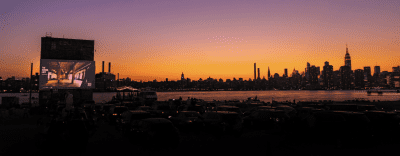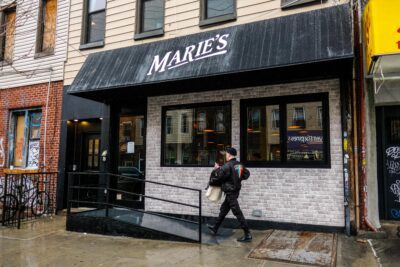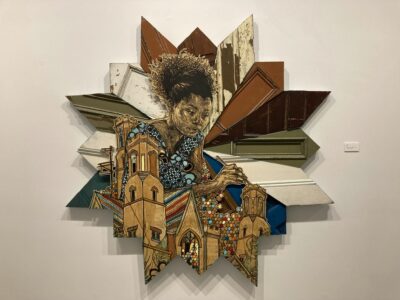Photo of Haiti's 2021 earthquake courtesy USAID’s Bureau for Humanitarian Assistance
‘It’s not looking good’: How Brooklyn’s Haitian community is rallying after the earthquake
Marie Paul, co-founder of the Haitian Nurses Network, discusses her work, the Haitian community in Brooklyn and how to help
In the last 30 days alone, Haiti has seen its president killed in a still-unsolved assassination, a 7.2 earthquake over the weekend, and then a storm that hampered early recovery efforts. All this in a small Caribbean island that never fully recovered from the last major disastrous earthquake just over a decade ago.
As the death toll of Saturday’s earthquake inches toward the 2,000 mark, Brooklyn’s Haitian community is rallying. The borough has more than 90,000 Haitian-Americans living in it, comprising 20 percent of its Caribbean population—and making it the third highest concentration of Haitians in the United States, according to Migration Policy Institute, a think tank based in Washington, D.C.
Many of then gathered at St. Jerome’s Roman Catholic Church in Flatbush’s “Little Haiti” on Monday for a prayer vigil, also attended by city leaders, as they sought solace and comfort before a long road to yet another recovery.
In that crowd on Monday was Marie Paul, a nurse practitioner and doctor of science who co-founded the Haitian Nurses Network in the aftermath of the 2010 earthquake that rocked her home country. Paul, who grew up in Port-au-Prince and has been in Brooklyn since 1988, is attempting to organize a trip to Haiti with fellow caregivers and health workers, but is struggling to amass enough resources.
Brooklyn Magazine caught up with Paul to discuss the news, her efforts and a learn a bit more about the Haitian diaspora in Brooklyn.


Courtesy Marie Paul
Why don’t you introduce yourself.
My name is Dr. Marie Paul and I am the founder of Haitian Nurses Network, and we are in the heart of Brooklyn, New York, which is where I came straight from Haiti, since 1988. This is what my culture is. It’s like Little Haiti, we have a lot of Haitian restaurants. The culture never left, and I never left the culture.
And you’re a nurse practitioner?
Yes. With a PhD in science. We are just about to open our first office on 1817 Flatbush Avenue.
Just outside Little Haiti. The earthquake hit on Saturday morning. Today is Wednesday. What are you hearing right now from Haiti and from your people there?
The situation is worsening, because there is a lot of rain that fell Monday night, I believe, and the roads are blocked, so no one has a way of, or means of getting, to the injured. So it’s not looking good. They sent me a lot of pictures and those are really graphic. I cannot even look at them or share them.
Do you still have family there?
Yes, I do have family there, but they are in Port-Au-Prince. I have my close, close friends that their family are in Jérémie, one on her cousin got a dislocated leg. So yes. Thank God no real injury to our immediate family.
That’s good. And you’re flying out there next week, is that right?
We’re still working on that. The other organization that was supposed to take us there sometime this week yesterday, to my understanding, told me that the government didn’t issue the money that was expected for them to get the plane to get us there. So right now we are working on our funds, our money, because we are very low on funding. We have no funding at all. So today I made a few phone calls trying to see if private entity would sponsor us to get there.
How easy or feasible is it for a group, even with the best of intentions, to get in there and be effective? It was a country in crisis before the earthquake.
Correct. With my group, we really want to go straight to one of these airports, which is … Jérémie [Airport], through a private charter to get us there, so this way we don’t have to be in the middle of any harm. So we’re looking to land to any of these places. And then we’re working underground with another organization that’s already been there. They have made promises to us that we will get lodging even if it’s in a tent, that they will provide us these places for us to be.
How can people help?
Well, we have a website which is myhnn.org, so you can donate to the site, or they could Zelle us through haitiannursesnetwork7@gmail.com. Those are the two ways because we want to do things transparently.
Tell me more about Haitian Nurses Network. You are a co-founder. When did you set it up?
I set it up 10 years ago after the first earthquake. Same thing: I wanted to get there to help, and I couldn’t find a way to get there, so I got upset. I said, ‘Okay, let me put a group of people on my own.’ We are a not-for-profit organization. We do take everyone. Anyone that can do for their community, that are part of a community, we welcome them to join us on this effort. So we’re looking for volunteers and members, so they could help within this crisis.
How long have you, yourself been in Brooklyn now?
From 1988, I’ve been in Brooklyn. I never left. So with HNN being here, we’ve been doing a lot of community services. We do at least two health fairs on our own, where we provide mammograms at no cost. We do Covid testing, Covid screening, Covid vaccine. We have done it all in the community, and we really emphasize on teaching disease awareness and disease prevention. S
And you’re from Port-Au-Prince originally?
I’m from Port-Au-Prince, yes. But my family, my grandma and grandpa are from the south, Jacmel and Bainet.
What was growing up in Haiti like?
It was fun to me when I was there. But after 1986, after [Jean-Claude “Baby Doc”] Duvalier left, two years later, I moved to New York. Pretty much, I had a good childhood so, and then I left two years after everything had changed. It’s never been the Haiti I knew. The Haiti I knew was never the same.
This earthquake comes after a presidential assassination last month. It seems like Haiti can’t seem to catch a break. Though there are deep-seated institutional reasons for that.
Correct. We feel very tired and exhausted, because it’s one thing after another; you don’t even know where to begin. You feel drained, this morning I got up, I’m like, okay, where do I begin? We have the right intention, the good intention, but we don’t know where to go, we don’t know who to turn to.
So you’re you’re doing it yourself.
Yes.
There’s a huge Haitian population in Brooklyn alone, I think there’s something like 90,000 Haitian Americans. How would you describe the diaspora here in Brooklyn?
We can be a tight community, but right now there is a lot of mistrust, because of the first earthquake and the funds that were provided were not adequately or transparently distributed to the cause. So there’s a lot of mistrust, and I don’t blame anybody. I feel the same way too, even trying work with organizations, I try to make sure that those organizations are legit, they doing what they say they’re doing, and they are very transparent. So there’s a lot of mistrust in the community, and I don’t blame them for it, and I don’t blame them for it. We very close knit, but it is what it is.
Can I ask a lighter question for people who are in Brooklyn reading this? Can you recommend a couple of Haitian restaurants that you’d love for people to visit?
[Laughs.] I love Kachè restaurant, and they are very good supporting of everything anybody’s doing in the Haitian community. They always there to support and they have a great ambience. They have live music. They very clean. Yes.
Okay. And any other tips for people who want to go support Little Haiti?
We also have La Caye’s. La Caye, who’s located on Flatbush Avenue, also, further up near Empire Boulevard. They too have some nice ambience, like Friday night on the rooftop. And he too is a businessman in the community, he’s done very well for all the Haitians and the community as well.
Anything else you want to add?
We are looking for any support and anybody who’s willing to sponsor us to get there, to do what we are meant to do, and what we are here to do is to reach out to the people and give them first aid. That’s what we want to do, because they are very limited on the nurses and the doctors that are down there. So this is why we want to be there.
You might also like 


























